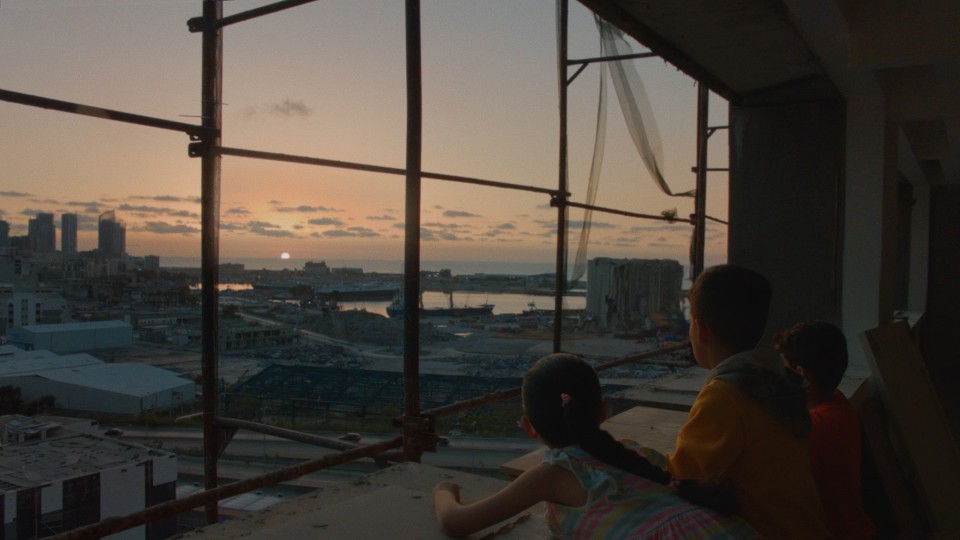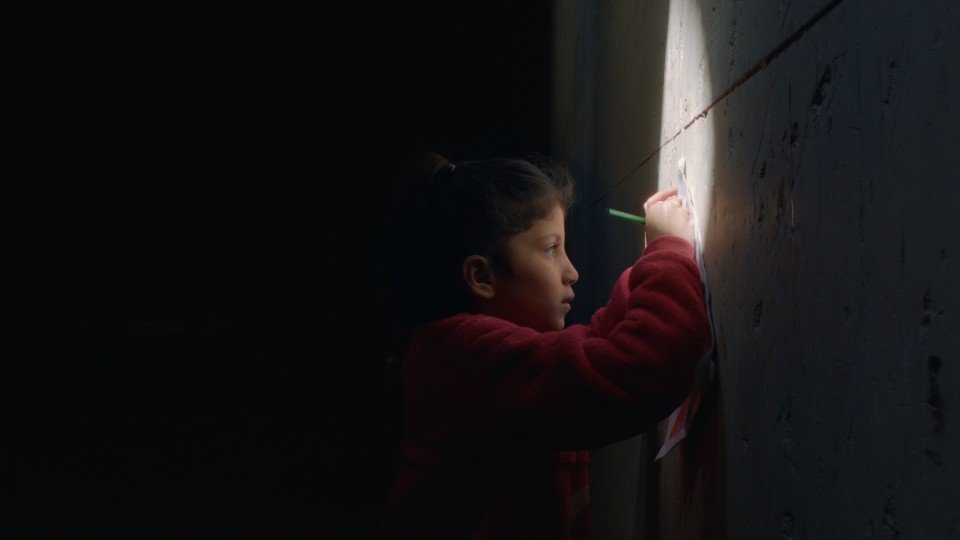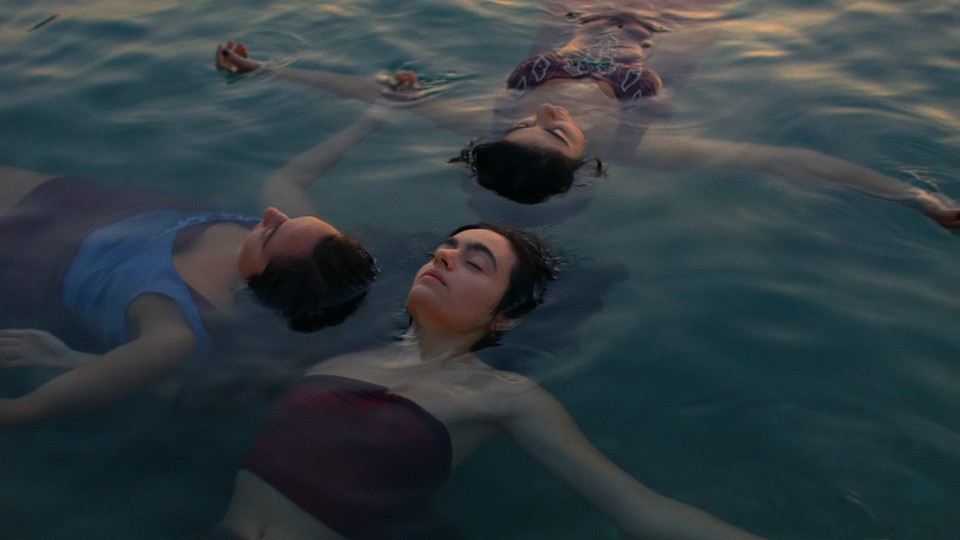Does your connection to Lebanon and Beirut date back a long time?
NICOLA VON LEFFERN: I worked for an NGO in 2011, and I was sent to southern Lebanon for a peace project. At the time I had no previous knowledge of the country; my image of the place had been filtered through the media – and when I got there, I was moved by how wrong it was. There are lots of regions in the world that we only hear about when something bad happens. I fell in love with Lebanon and found the conflict between media representation and reality extremely interesting. Later, Jakob and I met at the Vienna Film Academy, and we shot a short film together in Lebanon in 2015.
JAKOB CARL SAUER: The short is called Mafi Kahraba (Blackout). It's about the energy crisis in Lebanon. A situation that has become even worse since then.
One very impressive feature of the film are the brief mobile phone videos, allowing us to appreciate the incredible force of the explosion. Do you feel this scale has been adequately communicated in Western media?
NICOLA VON LEFFERN: I still remember being kept awake all night with worry and trying to follow what was happening via social media, attempting to reach people, because the mobile phone networks didn't work either.
The explosion has been exploited by the media. What happened in the vacuum afterwards is rarely depicted in the news. We were moved by the way people continue with their lives after traumatic experiences. To a certain extent, it’s still unimaginable. We tried to capture the point that there’s never really enough peace and space to process what happened.
What questions did you intend to pose with the concept for this film?
JAKOB CARL SAUER: Our primary concern was to see how people were doing. Then the need grew in us to accompany the process, to explore the issue of healing – to make this invisible inner life tangible. What about the much-vaunted resilience of the Lebanese people? Is this a commendable approach or just an enforced survival mode with positive packaging? We wanted to confront the situation without any preconceptions.
NICOLA VON LEFFERN: That would only be possible with long-term observation. We could never have dreamed that multiple crises were going to pile up: the pandemic, one of the most severe economic crises in the world, the complete failure of the state power supply everything merged together seamlessly. The revolution that began in 2019 had gained renewed energy – only to be completely wiped out by the consequences of the explosion. There was no strength left for faith in change. Things had reached a standstill.
Your protagonists also come from across the social spectrum. Can you briefly describe them?
JAKOB CARL SAUER: We wanted to depict Beirut with its religious plurality, its social disparity. In the end, coincidence and accessibility helped decide who we would accompany over the three years. Selim, one of our protagonists, is an artist and activist. We met him because we lived in the same house. Then there is the Aladdin family, who have lost a family member. The cohesion within their family and their common faith in dealing with the situation were very striking.
NICOLA VON LEFFERN: Andrea is an impressive young woman who fought for change on the streets for a whole year during the revolution. We accompany her in dance therapy as she strives to become a central feature of Beirut's performance scene. Aya, the eight-year-old girl, lives with her five siblings and her parents in an underground car park. They fled from Syria to Beirut only to find themselves caught up in another catastrophe.
Again and again, we see scenes featuring an emergency phone service for people contemplating suicide. How widespread are such aid facilities?
NICOLA VON LEFFERN: This telephone counselling service is the only hotline in the country. In the days around the first anniversary of the blast, when there was not only no state electricity but also no diesel nor gasoline for private generators, even this emergency hotline had to go offline. When the electricity came back on, a few days later, information about the increased suicide rate was published. That's how Embrace, this hotline, got media attention, and we learned about it.
JAKOB CARL SAUER: The people who work there provide sustainable care for people in a state of emotional distress, even though they themselves are affected by the stress all around.
NICOLA VON LEFFERN: Whoever has access to it, takes anti-anxiety medication.
To what extent does Beirut also symbolize a place where those in power have completely abdicated their responsibility?
JAKOB CARL SAUER: I have never been to a country where there is a more powerful manifestation of hospitality. In human terms, you never feel uncomfortable. Neighbors, family, friends – they all take care of each other, partly to compensate for what the government fails to provide. This failure of government means that people are forced to deal with daily problems, such as electricity, water or gasoline shortages. No one can make serious plans for the future.
NICOLA VON LEFFERN: The discrepancy between the civilian population and the government, or non-existent leadership, is enormous. Personal responsibility is absolutely dominant; there are many grassroots organizations, NGOs from outside and also very many from inside the country. People love the place and want it to be better. It’s painful to see this hope being shattered again and again. A young generation grows up, takes to the streets – and is then forced to see that things aren’t going to get any better in the foreseeable future. Beirut can’t be summed up in one sentence. It's the most beautiful place in the world and a horrible place. The film is the start of an effort not merely to tell the same old story of misery but also to show that there is art and theatre, a lively party scene, a powerful desire for expression and vivacity. People take refuge in nightlife because you never know what tomorrow will bring. There's the sea, the mountains, the sun, the snow, the misery, the dirt, ruins, and right next to them state-of-the-art buildings with the most expensive cars I've ever seen. Everything coexists.
What is striking about all the protagonists is their consumption of Western media, at least the English-language variety. Does this have to do with the political situation and the media landscape?
JAKOB CARL SAUER: Western media is consumed, but there are also important local media outlets in Arabic. This impression arises because a lot of English is spoken in Lebanon – which many people don't know. The official languages of the country are Arabic and French, but generally communication is in three languages.
NICOLA VON LEFFERN: The presence of media in our film is connected with the fact that media consumption is so extremely high there. You can't say: I'm not going to follow current events for two days. Everything about your day depends on whether you know what's going on: Will there be any electricity? Are there protests? Are the roads closed? Are there air strikes? You wake up in the morning and start finding out the challenge of the day. Media consumption is excessive, and that’s also unhealthy. In Europe, people consume media because they are interested in the world. There, you have to access the media to know what to expect in your personal life that day.
How did you position yourselves, and question your roles as documentary filmmakers, in this context?
JAKOB CARL SAUER: Of course you have certain ideas, but it’s not very beneficial to trawl through reality with your preconceptions until your own view is confirmed. It was important to us to take the time to get involved with the place and its rhythm. The film was constantly adapting itself in our heads.
NICOLA VON LEFFERN: It was also important to keep asking how and why we look at things. Where do we add value because we are not Lebanese? For example, we were able to make contact with people across the religious spectrum, because we didn't belong anywhere. Because we hadn’t experienced the explosion ourselves, we could offer a lot of space to listen. At the same time, however, we always had to check ourselves so as not to make a film through a Western filter. We didn't want to be the next ones to delude ourselves that we could explain the Middle East.
Did you also encounter resistance?
NICOLA VON LEFFERN: We did. In the aftermath of the revolution and then the explosion, the international media left behind a lot of scorched earth. They arrived to cash in quickly on the trauma experienced by the people. When we got there, we had to work very carefully to build trust, to convey that we wanted to work differently. We wanted to stay, to listen, and to build up serious relationships outside of the shoot, going far beyond the immediate relevance of the film.
Filmmaking as a way of life?
NICOLA VON LEFFERN: Yes. The filmmakers we adore all work like that. You can only achieve maximum personal involvement if there’s no beginning and no end point. By becoming one with the theme of the film. Jakob and I are a small team, just the two of us. We are also very close to each other; we were extremely private there. We didn't go to Beirut as filmmakers, but as Jakob and Nicola, and sometimes the camera was there. In my private life, I constantly had to question myself in my role, myself as a person. How does friendship function? How does work function? How does a relationship function?
The opening and closing images are a view of the vast ocean, where the water and the cloudy sky blur and merge. What associations did you have with these two images?
JAKOB CARL SAUER: For me, it expresses the longing for a secure and peaceful home. But it also plays with the ambivalence that for many people, the sea is the only escape route.
NICOLA VON LEFFERN: For me, it stands for what people love about their home. Despite everything we say, you shouldn't forget that Beirut is an incredibly beautiful city. Behind the city there are snow-capped mountains, and in front of it is the Mediterranean. The sea is for everyone. No matter how bad the day may have been, when it draws to a close you go down to the sea and look at the water. And that might just make it feel bearable.
We conducted this interview on September 12, 2024, a few days before the violence in Lebanon escalated in a shocking way and some of the filmmakers' statements are to be seen in a new light. We therefore asked them what these events mean to them:
The situation in Lebanon is catastrophic. Over a million people have already been displaced, and the numbers continue to rise
as now not even Beirut is safe.
The help hotline is overwhelmed, with calls flooding in day and night as people desperately seek information on where they
might find safety. Selim opened his atelier to families forced from their homes. "Apologies, but you need to bring mattresses
with you." He wrote in his post. Not long after, he too had to evacuate and leave Beirut. Many flights are being canceled.
Andrea had planned to come to Zurich for the premiere, but now we are relieved if she can get out at all. Aya and her family
are still sheltering in their garage, with no other options available. Thankfully, the Aladdin family remains unharmed, despite
living in southern Lebanon. A neighboring village has already been destroyed by a rocket attack. "You can imagine how powerful
the bomb was, shaking the ground despite its distance," he wrote when asked how they are doing.
We long for a ceasefire with all our hearts. This suffering is unacceptable and no one should have to endure it.
Nicola von Leffern, Jakob, Carl Sauer, October 3, 2024
Nicola von Leffern, Jakob, Carl Sauer, October 3, 2024
Interview: Karin Schiefer
September 2024
Translation: Charles Osborne








